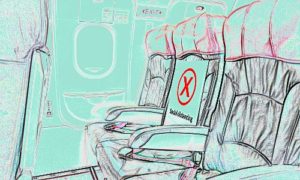Keeping the middle seats vacant during a flight could reduce passengersʼ exposure to airborne coronavirus by 23%- 57%, researchers reported in a study that modelled how aerosolised viral particles spread through a simulated airplane cabin, writes MedicalBrief. Multiple airlines have rejected the findings because it did not take into account mask-wearing.
“Farther is always better in terms of exposure,” said Byron Jones, a mechanical engineer at Kansas Sate University and co-author of the study.
“Itʼs true in airplanes, itʼs true in movie theaters, itʼs true in restaurants, itʼs true everywhere.”
But, reports The New York Times, the study may have overestimated the benefits of empty middle seats because it did not take into account mask-wearing by passengers.
“Itʼs important for us to know how aerosols spread in airplanes,” said Joseph Allen, a ventilation expert at Harvard TH Chan School of Public Health who was not involved in the study. But he added, “Iʼm surprised to see this analysis come out now, making a big statement that middle seats should stay open as a risk-reduction approach, when the model didnʼt include the impact of masking. We know that masking is the single most effective measure at reducing emissions of respiratory aerosols.”
The NYT reports that although scientists have documented several cases of coronavirus transmission on planes, airplane cabins are generally low-risk environments because they tend to have excellent air ventilation and filtration.
Still, concern has swirled around the risk of airplane travel since the pandemic began. Planes are confined environments, and full flights make social distancing impossible. Some airlines began keeping middle seats vacant as a precaution.
The study published in the Morbidity and Mortality Weekly Report, is based on data collected at Kansas State University in 2017. In that study, the researchers sprayed a harmless aerosolized virus through two mock airplane cabins. (One was a five-row section of an actual single-aisle plane; the other was a mock-up of a double-aisle wide-bodied plane.) The researchers then monitored how the virus dispersed through each cabin.
Multiple airlines, including American Airlines, United Airlines, Delta Air Lines, Hawaiian Airlines, and Southwest Airlines, have rejected the study and deferred to the trade organisation Airlines for America on the issue when reached for comment, reports Business Insider.
"Multiple scientific studies confirm that the layers of protection significantly reduce risk, and research continues to demonstrate that the risk of transmission onboard aircraft is very low," a spokesperson for Airlines for America told Business Insider, indicating no changes would be recommended to airlines.
The trade organisation also pointed to Department of Defence and Harvard studies, as well as data from the International Air Transport Association, finding low transmission rates among passengers since the start of the pandemic.
Henry Harteveldt, an industry analyst and cofounder of Atmosphere Research Group, is quoted in Business Insider as saying that this likely wouldn't change the course of airlines that had already decided to fill planes.
"The airlines will look at it and go, 'Oh, that's nice – moving along,'" Harteveldt said.
Airlines are riding high after a long year of losses, and some are starting to report positive cash flow. Harteveldt said airlines likely would not revert to blocking middle seats unless mandated by the federal government.

